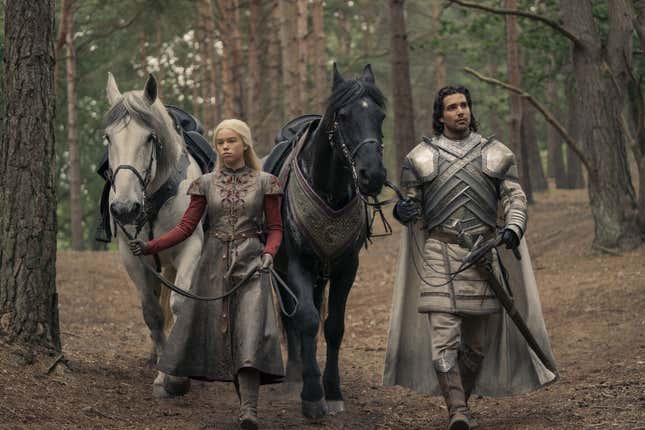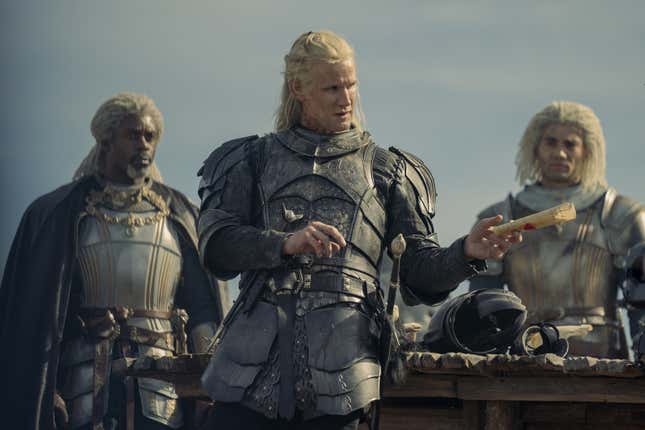I Didn’t Want to Love ‘House of the Dragon,’ But I Can’t Look Away
GoT had one of the most heartbreakingly stupid endings in TV history. Yet, here I am, back on HBO Max every Sunday night, desperate for more.
EntertainmentTV

The ending of Game of Thrones is widely regarded as an epic failure—the dragon lady went nut-nut, her boyfriend had to kill her to save the world, and some teenage boy who has prophetic visions was unceremoniously crowned king for no real reason. If you dig deep enough, there was a decent message beneath it all: The Iron Throne and the lust for power that it symbolized was, perhaps, the real villain all along. But did we really need all the tired misogyny and violence against women to land at that conclusion? Was crowning said teenage boy really the one and only solution, as the randomly selected council of lords posited, when Sansa Stark was right-fucking-there?? I could go on, but frankly, doing so takes me back to a bad place to which I’d rather not return.
After that god-awful GoT finale, aware that more books were to be released and a whole-ass prequel show had been announced, I swore off this franchise. And I’ve lived a relatively peaceful life, sans covid and an attempted insurrection, in the three years since. Yet, after the third episode of House of the Dragon aired this Sunday, I find myself hooked all over again.
Admittedly, I’m quite enjoying this notoriously mid-tier dragon show, described by Slate as “more like House of Drag-On,” quite a bit!! For the past several weeks since the show premiered, I’ve clearly found no shortage of issues with the show to bitch about. Yet, it’s something to look forward to on Sunday nights, it’s undeniably entertaining, and it’s familiar and nostalgic in a way that almost makes watching sailors be eaten alive by crabs… comforting…?
I can understand why critics have called the first two episodes, and, in my opinion, the first 30 minutes or so of Sunday’s episode, slow-paced—not a whole lot happens beyond predictable, shadowy politicking and very domestic father-daughter stand-offs. Much of this continues in this week’s episode, which sees King Viserys married to his teenage daughter Rhaenyra’s (former) best friend Alicent, with their infant son now 2 years old and another child on the way. Rhaenyra is understandably pissed, well-aware that as a boy, her half-brother is likely to supplant her as heir, and she’s understandably even more pissed when she discovers her father is trying to arrange her marriage to some lord. It’s all very angsty and melodramatic—and while this storyline is a departure from the usual hacking, slashing, and penis-chopping of House of the Dragon’s predecessor, I am here for it.
It’s the last act of the episode that’s cemented my obsession with this show. Things have not been going well for Daemon Targaryen, the king’s chaotic and unexpectedly, unfortunately sexy younger brother, and the Velaryons—led by former Master of Ships Corlys Velaryon—in their fight against the pirate army, led by the ghoulishly brutal Crab Feeder. In one of the final scenes of the episode, Daemon single-handedly takes on an army of the Crab Feeder’s men in a battle reminiscent of Jon Snow during one particular moment of GoT season 6’s Battle of the Bastards. You know the one: Things are looking bad, but still, Jon—not even mounted on a horse—heroically unsheathes his long sword, stands all by himself, and stares down Ramsey Bolton’s massive approaching army. (Of course, moments later, Sansa arrives with a massive army of reinforcements to save his ass like the queen she is—but somehow, all we remember of the battle is this image.)

It’s moments like this in House of the Dragon—Daemon emerging as a Jon Snow-esque one-man army, or last week, Rhaenyra riding in on a dragon to disrupt Otto Hightower and Daemon Targaryen’s stand-off, looking virtually identical to her GoT descendant Daenerys—that somehow make all of the disappointing aspects of this show worth it. The awfulness of GoT’s finale alone can’t wipe the deeply meaningful relationships audiences forged with the show’s characters. It’s that love for the characters themselves, however stupidly and unfairly their stories might have ended, that keeps drawing me—and clearly, millions of others—back to this franchise. These precious, fleeting moments of callback and familiarity return us to GoT’s most iconic moments. And mediocre as House of the Dragon’s wigs and random accents may be, I’m here for the nostalgia.
All of that said, I can feel it in my bones that this new story is not going to end well. Call it instinct, or call it thoroughly reading the expansive Wiki for the books on which House of the Dragon is based. Considering where GoT begins, in a kingdom that’s never known a successful female ruler, I’m disinclined to get too attached to Rhaenyra, as her story clearly doesn’t end with her becoming a prosperous Queen. And the criticism still stands that given all the violent sexism in the real world we’re reckoning with on a daily basis, regularly consuming inescapable misogyny in a fantasy TV show brimming with magic and dragons is frustrating, to say the least.
Nonetheless, here I am, and here we are—back on HBO Max every Sunday night, desperate for more.